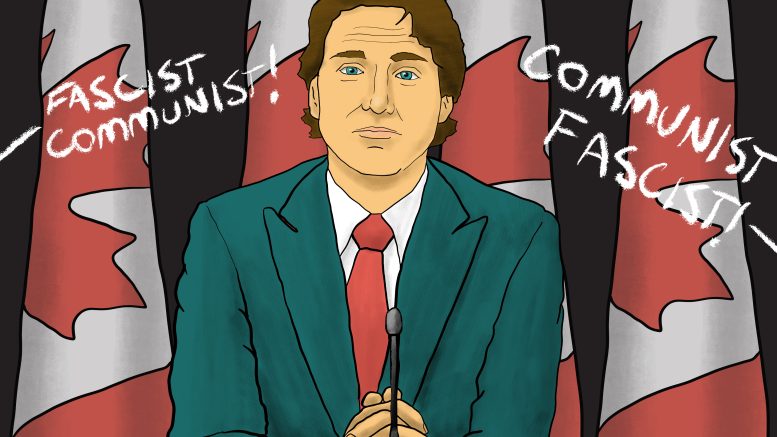If you follow politics, even on a surface level, you have probably seen someone attack a political figure such as Prime Minister Justin Trudeau or federal NDP leader Jagmeet Singh for being “socialist” or a “fascist.”
Sometimes figures like these two are labelled as a socialist or fascist simultaneously by unknowledgeable people on social media. Leader of the Conservative Party of Canada Pierre Poilievre even claimed that Trudeau has a socialist agenda.
However, none of these people using these terms take the time to explain what socialism or fascism is, and how these political figures fit those definitions. Given how often the terms are used interchangeably, you might think that they are all the same concept, or even that liberalism is the same thing as socialism.
First, let’s define these terms, and then let’s explain how it really does not make sense when people refer to Trudeau or Singh with these terms.
Socialism is effectively a form of government or social organization in which there is collective ownership of the means of creation and distribution of goods. The basic tenet of socialism is that there is public rather than private ownership of goods. Therefore, a “socialist” is someone who follows this ideology.
Fascism, however, is a totally different ideology. Fascism involves an all-powerful government characterized by nationalism and headed by a dictator who exerts complete control over society, economy and the political sphere.
Now, according to Pierre Poilievre, Trudeau has an apparent socialist agenda. So, let’s compare the platform of the Liberal Party of Canada, which Trudeau leads, with our definition of socialism.
While there is mention of supporting workers and businesses, there is not a single word of putting the means of production into the hands of the workers. If Trudeau and the Liberal party truly were socialists and wanted collective ownership for all, it is highly unlikely that supporting businesses as they currently are would be within their interests.
While the Liberal party might not be socialist, let’s see if it is fascist.
Once again, scouring the party’s platform reveals not a single word regarding an interest in centralizing power within their party. In fact, part of its platform is “an equal Canada, for everyone.” Further, the Liberal party states that it is dedicated to positioning Canada as a more equal and fair society. So, it would seem that either the Liberal party is the first fascist party to be oriented toward equality, or it simply is not fascist.
At no point in this article am I endorsing the party’s policies, Justin Trudeau or even contemporary liberalism. Rather, my point is that terms like socialist, communist and fascist cannot reasonably be applied to Justin Trudeau.
I am not stating that the Liberal Party of Canada has never engaged in political overreach or any other form of political failure. But if you are going to critique political figures, use terms that apply to them. As it stands, terms like socialist and fascist have been reduced to buzzwords to describe any political behaviour that someone dislikes.
If someone like Trudeau adopted policies relating to collective ownership it would, in my opinion, benefit Canadian society and would genuinely be socialist. But as it stands, the many people who refer to Trudeau or any number of non-socialist politicians as socialist are just wrong.
Political terms are loaded with meaning, and it’s your responsibility as a citizen to understand those meanings. We should not just attack people with any political buzzword that comes to us in a moment of rage.


